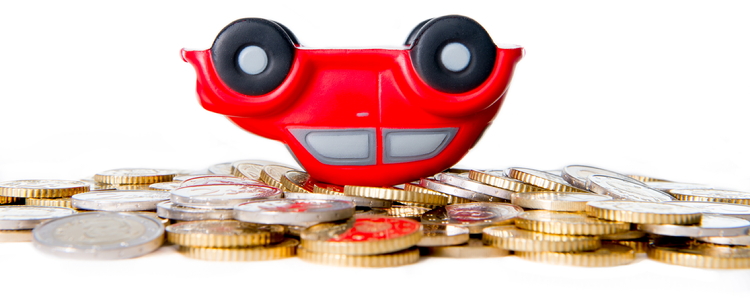There are many different ways car buyers deal with negative equity on their trade-ins. Studies have found that the majority of consumers deal with this all-too-common situation in the worst possible way – which is rolling your negative equity into your next loan. There are pros and cons to taking this tactic, and we recommend avoiding this route. Here's what we know about whether or not you should trade in a car with negative equity.

Should I Trade in a Car with Negative Equity?
Why Avoid Trading in a Car with Negative Equity?
Having negative equity is sometimes also referred to as being "underwater" or "upside down." Regardless of the word you use, negative equity is a growing problem with loan amounts rising and loan terms increasing.
Having negative equity isn't typically an issue if you plan to keep your car for a while and/or pay off the loan in full. It only becomes a problem when your vehicle is totaled, or stolen, or you want to trade it in halfway through the loan term.
Let's look at an example of why being upside down can present an issue if you want to trade in your car. Say you have a balance of $12,000 left on your auto loan, but the vehicle is only worth $10,000. This means you have $2,000 worth of negative equity—and it isn't going to just disappear. Your options are to either deal with it now or deal with it later.
If you want to trade in your car, rolling the balance over into a new loan means paying on the new vehicle, plus the $2,000 from your last car. This means you're making payments on two cars at once, and your monthly payment and interest charges will be larger, as a result.
Worse yet, it typically means you'll be further upside down in the new loan. Rolling negative equity into a new loan just compounds your problem, which can create a debt cycle that can quickly spiral out of control.
For these reasons, every expert on the subject, including the team here at Auto Credit Express, will tell you that trading in a car with negative equity should always be viewed as a last resort option. This statement rings more true for those dealing with less-than-perfect credit, especially considering the higher-than-average interest rates these borrowers face.
Instead, it will be in your best interest to look at these alternatives:
- Cover the negative equity out of pocket.
- Find a new car with a big manufacturer rebate attached. If you don't have the cash to cover the difference out of pocket, this is a good alternative to explore.
- Hold off on trading in your vehicle until you are no longer underwater or you have paid off the loan. Try making larger payments than your minimum amount to take care of this faster.
- Try to sell the car yourself to get more than you would if you were to trade it in.
The Story So Far
Over the past few years, new car prices have increased dramatically while the average American paycheck has remained the same or decreased for some. As a result, the amount of money the average car buyer can put aside for a monthly car loan payment has remained flat. The Seasonally Adjusted Annual Rate (SAAR) projection for new car sales this year is up, most analysts predict around 15 million new cars will be sold in 2023.

One of the ways captive OEM finance companies, as well as local banks and credit unions, have addressed higher automobile costs, and lower consumer disposable income, is with extended loan terms. Many years ago the standard loan term for a new car was 48 to 60 months. At that time it was normal, and mostly expected, that new car buyers have a reasonable, if not substantial, cash down payment. Today, this is no longer the case. Many car shoppers are buying expensive new cars with loans that have little or no money down, while at the same time controlling the monthly payment with extended loan terms of 72 or 84 months.
Buying a new car with little to no money down and a loan term of at or over 72 months is quite common and has created an epidemic of negative equity. Under the scenario above, most people will owe more money on their car loan than what the vehicle is worth, for almost the entire length of the loan. At Auto Credit Express, we recommend that consumers should never trade their car in, and buy a new car if they have negative equity. Negative equity simply does not just go away. Like a virus, it gets bigger and migrates to your new auto loan.
The problem is exacerbated if your credit score has decreased due to the economic downslide we’ve been in over the past few years. If this is the case, the interest rate on your new car may be higher than it was on the vehicle with negative equity that you are trading in. For most of us, it just does not make sense to roll over negative equity to another loan, which may have a higher rate.
When You Should Trade in A Car with Negative Equity
We realize there are circumstances that warrant trading in a car with negative equity such as:
- Needing a car which seats more passengers
- Needed auto repairs are cost-prohibitive
- Driving a vehicle with a very poor MPG rating long distances to work
- Needing a lower monthly car payment (it is rare that people with negative equity are able to lower their monthly car loan payment)
If any of those circumstances apply to you, or you just really want to trade in your car with negative equity and a low credit score, the following advice may help. First, you should know that lenders typically will not lend more money than the car is worth, especially to people with low credit scores. To better your chances of getting approved you should lower the amount of negative equity.
How To Lower Negative Equity Amount During Trade-in
The easiest way of course is to apply a cash down payment that is larger than the amount of negative equity, for most people who are underwater in their trade, however, this is not possible. One of the best recommendations we have at Auto Credit Express is to find a used car that has a high Book Value and a low Market Value.
- Book Value. There are three major valuation sources used to access the value of a used car, the NADA Valuation Guide, Kelley Blue Book (KBB), and Black Book. Prior to the Internet and technology explosion, these source valuations were only available in printed format, thus the name Book Value was created. Even today, many used car managers have one of these books in their back pocket.
- Market Value. The agreed-upon price between a buyer and seller
Vehicles that have a high book value and low market value are typically vehicles that are in low demand and high supply. That is not to say that these are undesirable vehicles, merely that there are a lot of them for sale in an area. A common cause of this is off-lease vehicles. If the manufacturer placed a special 36-month lease incentive on a new car model three years ago, because they were overstocked, then the used car market would be overstocked with these same vehicles today. Another approach is to find a new car that you want to own, which has a very large rebate. The cash rebate can be used toward the down payment, which of course would lower the negative equity.
The Bottom Line
Many folks trade in their vehicles with negative equity just because they want to drive a new car. The desire for a new car, however, may result in increasing your debt versus equity even more. If possible, we strongly recommend keeping your vehicle until the negative equity has been erased.
In an ideal world, you would always have equity in your vehicle so you could avoid this situation. Because negative equity is a common issue, however, it's best to figure out a way to avoid trading in a car when you are upside down in your loan. Buyers, especially those dealing with credit issues, should do whatever it takes to avoid this situation.
Another car-buying roadblock besides negative equity can be your credit. Having bad credit or no credit can make it difficult to get approved for a car loan. Luckily, Auto Credit Express is here to try to make that process easier.
We connect car buyers to local special finance dealerships that know how to work with challenging credit situations. Our service is free of charge and obligation, so go ahead and get started by filling out our car loan request form right now.

Senior Automotive Financing Editor
Meghan has been writing professionally for over 25 years. She is expertly versed in automotive special financing and pricing analysis, having published hundreds of articles on Auto Credit Express and its sister sites, CarsDirect, and The Car Connection. Read more
Suggested Posts For You
Receive Free Updates
Get the latest credit tips, resources and advice delivered straight to your inbox.













